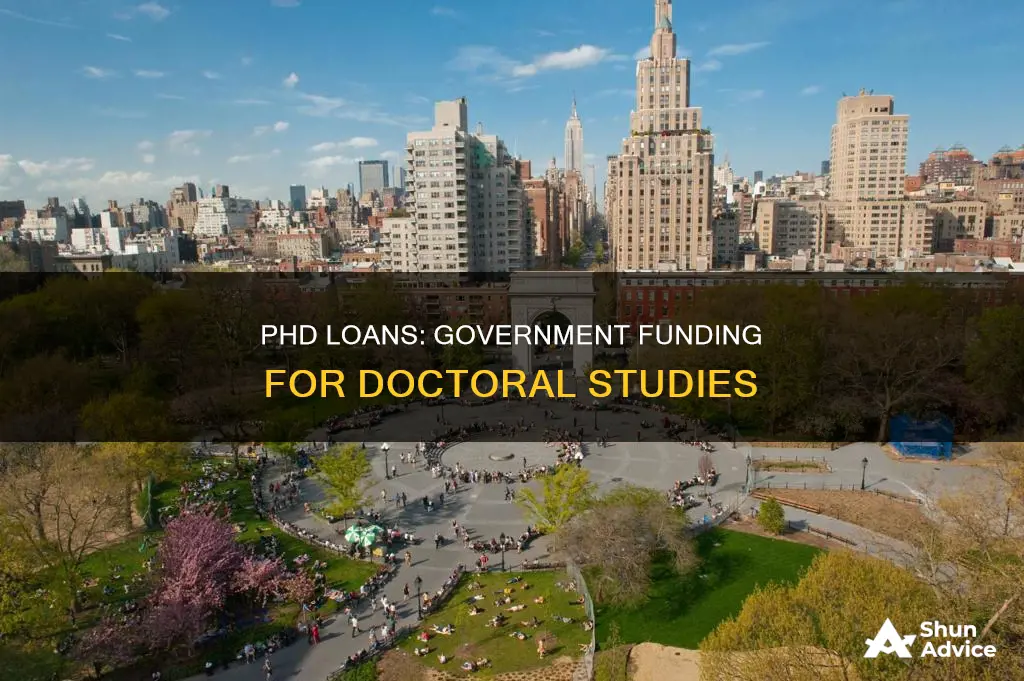
Doctoral degrees are an important step for many students, but they can be expensive. In the UK, the government has introduced doctoral student loans to enable around 3,000 more people per year to study for a doctorate. These government-backed loans can be used to fund a student's whole university education. However, doctoral degrees are not eligible for Public Service Loan Forgiveness (PSLF), and there are concerns that mounting loan repayments may counteract any PhD salary premium. In the US, federal student loans are available for PhD students, with income-based repayment plans and loan forgiveness options. Private student loans are also an option, with lenders such as Sallie Mae and Earnest offering loans for graduate students.
What You'll Learn

Government-backed PhD loans
Postgraduate Doctoral Loans are available for students pursuing a PhD in the UK. These loans can help with course fees and living costs, and are provided by the UK government through Student Finance England. The loan is paid directly into the student's bank account by the Student Loans Company (SLC) in three instalments per academic year. Students can apply for these loans in any year of their course, but the maximum amount is only guaranteed if they apply during the first year.
To be eligible for a Postgraduate Doctoral Loan, students must meet certain criteria. They must not already hold an equivalent doctoral qualification and must be studying at an eligible university in the UK. Additionally, students must have lived in the UK, the Channel Islands, or the Isle of Man for three continuous years before the start of their course. There are specific eligibility requirements for EU nationals and their family members, which can be found on the Student Finance England website.
The amount offered through the Postgraduate Doctoral Loan scheme varies depending on the year of study and the student's place of residence. For courses starting in 2023/24, the maximum loan amount was £28,395. In 2024/25, the Welsh government offered eligible students ordinarily resident in Wales up to £28,655, while PhD loans of £29,390 were available for students in other parts of the UK. It is important to note that PhD loans cannot be combined with other public funding, such as Research Council studentships or NHS funding.
Repayments for Postgraduate Doctoral Loans begin once the borrower completes their PhD and is earning at least £21,000 per year. The repayment rate is 6% of the borrower's income over this threshold, and interest is charged at the retail price index (RPI) +3%. Any outstanding balance is written off 30 years after the loan first becomes due for repayment.
In addition to government-backed loans, there are alternative funding options available for PhD students. These include fellowships, teaching or research assistant positions, tuition reimbursement from employers, and work-study programs. Private student loans from lenders such as Sallie Mae and Earnest can also provide funding for PhD programs, although they may have different eligibility requirements and repayment terms.
Cosigner's Risk: Forbearance Loans and Their Impact
You may want to see also

PhD loan eligibility
PhDs are an important but expensive endeavour. Luckily, there are a few options available to help fund your studies.
Government Loans
The UK government offers Postgraduate Doctoral Loans to help fund full-time or part-time master's degrees. To be eligible, you must be a UK national and ordinarily resident in England or Wales, and you must be aged 59 or under on the first day of the first academic year of your PhD. You also must not already have a PhD, be in receipt of other UK public funding, or be receiving UKRI funding for your PhD.
If your PhD programme includes an integrated master's degree, you can still apply for the loan, but you must register for a full doctoral degree. You will not be able to apply for a separate Postgraduate Master's Loan.
If your course is delivered by more than one university and one is overseas, you can still be eligible for the loan as long as the UK university is the lead institution, and you spend at least 50% of your study time in the UK.
Private Loans
Private companies such as Sallie Mae and Earnest offer loans for graduate students seeking various degrees and certifications, including PhDs. These companies can offer to cover up to 100% of your educational costs, with repayment terms of up to 15 years.
Other Options
There are other options available to help fund your PhD studies, such as fellowships, teaching or research assistant positions, tuition reimbursement from your employer, or work-study programs.
GM Financial: Loan Modification Options and Opportunities
You may want to see also

Private PhD loans
When it comes to funding a PhD, federal loans should be the first source of funding. However, when federal loans are not enough, private student loans can fill the financial gap. Private PhD loans can be harder to qualify for and may have less flexible repayment plans. They also tend to have higher interest rates, which can result in higher overall costs.
If you are considering a private PhD loan, it is important to review your options for when repayment starts. Can you make immediate, interest-only, or deferred payments while in school and for several months after you graduate or start a postdoctoral research or internship program? Most private student loans for PhD programs don't include an application or origination fee, but you must pay interest charges. The interest on these loans starts accruing from the date of disbursement, so the longer it takes to repay the loan, the more you will pay in interest over time. For example, a PhD student loan of $50,000 with a 7% interest rate will accrue $19,665 in interest charges over 10 years. If the interest rate is higher, at 10%, the total interest charges over 10 years would be $29,290.
Your or your cosigner's credit score will have a major impact on the rate you get for a private loan. Borrowers with the best credit may qualify for a lender's lowest rates, while those with weaker credit could pay a higher interest rate. Adding a creditworthy cosigner to your private loans can often unlock lower rates and higher loan limits.
Some private lenders to consider for PhD loans include Sallie Mae, the largest private student loan lender in the country, and Earnest, a popular online lender. Sallie Mae offers loans for graduate students seeking various degrees and certifications, covering up to 100% of educational costs. Earnest's Graduate School Loan covers PhD programs in all states except Nevada and can help cover between $1,000 and up to 100% of school-certified educational costs. SoFi is another private lender that stands out for its extensive member benefits, including financial products, financial planning, and other resources to help borrowers succeed.
Gabbana's Fashionable Friendship with Melania Trump
You may want to see also

PhD loan implications
In the United States, there are federal and private loan options available for PhD students. Federal loans, such as Direct Unsubsidized Loans and Grad PLUS Loans, are recommended as the first source of funding due to their valuable protections and programs. Private lenders like Sallie Mae and Earnest also offer loans for graduate students seeking various degrees, including PhDs, with flexible repayment terms and the possibility of loan deferment during postdoctoral research.
Regardless of the country, taking out loans for a PhD can have significant financial implications. Students should carefully consider the potential impact on their future financial stability, especially with the understanding that PhD programs typically do not qualify for Public Service Loan Forgiveness (PSLF). It is crucial for prospective students to weigh the benefits and costs of doctoral study against employment, as loan repayments may influence their career choices and long-term financial planning.
Additionally, it is worth noting that PhD loan completion rates are lower than undergraduate rates, and running out of money is a common reason for students dropping out. Therefore, prospective PhD students should thoroughly research their funding options, including fellowships, teaching or research assistant positions, tuition reimbursement programs, and work-study programs, to ensure they can complete their degree without incurring excessive debt.
GM Loaner Vehicles: What's the Deal?
You may want to see also

PhD funding alternatives
Although federal loans should be your first source of funding for a Ph.D., they are unlikely to cover all the costs. Here are some alternatives to consider for funding your Ph.D.:
Fellowships
Fellowships can come from your school or external sources, such as corporations or the government. They usually offer financial support without any teaching or research obligations. Check with your school's financial aid office for more details on fellowship opportunities. Some examples of external fellowships include:
- The Belgian American Educational Foundation (BAEF) offers fellowships for advanced study or research during one academic year at a Belgian University or institution of higher learning. The fellowship includes a stipend of $29,000 for Master's or Ph.D. students.
- The French Institutes for Advanced Study Fellowship Programme offers 10-month fellowships in the seven Institutes of Aix-Marseille, Loire Valley (Orléans-Tours), Lyon, Montpellier, Nantes, Paris, and Rennes. It is open to all disciplines in the social sciences and humanities and all research fields.
- The Churchill Scholarship Program enables young Americans to pursue graduate study in science, mathematics, and engineering at Churchill College, Cambridge University. The scholarship covers living expenses, tuition, and fees.
Scholarships and Bursaries
Charities, foundations, and trusts provide a range of funding for postgraduate research, including scholarships and bursaries. The Alternative Guide to Postgraduate Funding is an online resource that can help you find and apply for these alternative sources of funding.
Work-Study Programs
Work-study programs provide extra money for tuition and expenses in exchange for part-time work related to your field of study.
Teaching or Research Assistant Roles
Taking on a role as a teaching or research assistant can pay for your tuition and often comes with an annual salary and health insurance.
Private Student Loans
When federal loans are not enough, private student loans can fill the financial gap. Sallie Mae, for example, offers loans for graduate students seeking various degrees, covering up to 100% of certified educational expenses.
Fannie and Freddie: College Loan Options Explored
You may want to see also
Frequently asked questions
Yes, the government does provide PhD loans. In the UK, prospective students can apply for up to £25,000 to be spent over a maximum of eight years of study. In the US, PhD students are eligible for up to $20,500 in Direct Unsubsidized Loans each year, up to $138,500 in total.
Some alternatives to government-provided PhD loans include fellowships, teaching or research assistant positions, tuition reimbursement from employers, and work-study programs.
Some private loan options for PhD students include Sallie Mae, Earnest, and SoFi.
When taking out a loan for a PhD, it is important to consider the potential impact on the student-supervisor relationship, the completion rate of the program, and the potential salary after graduation. It is also important to compare interest rates and fees from different lenders to find the best option. Additionally, adding a creditworthy cosigner to your loan can help you unlock lower rates and higher loan limits.







